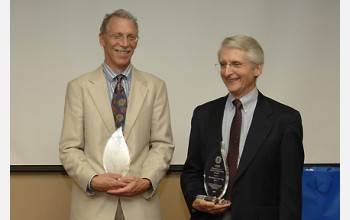News Release 07-078
NSF Announces First Annual Computer and Information Science and Engineering Distinguished Education Fellows
Fellowship program is part of a wider initiative to improve undergraduate computing education

The 2007 CISE Distinguished Education Fellows, Owen Astrachan and Peter Denning
July 13, 2007
This material is available primarily for archival purposes. Telephone numbers or other contact information may be out of date; please see current contact information at media contacts.
The National Science Foundation (NSF) announced the first annual Computer and Information Science and Engineering (CISE) Distinguished Education Fellows at a ceremony at NSF's Arlington, Virginia, headquarters. Owen Astrachan of Duke University and Peter Denning of the Naval Postgraduate School were each recognized for their outstanding efforts to revitalize undergraduate computing education in the United States.
As part of the fellowships, Astrachan and Denning will receive funding from NSF to continue their work over the next two years.
The fellowships are a component of a broader NSF initiative called the CISE Pathways to Revitalized Undergraduate Computing Education Program (CPATH) Program. CPATH is working to ensure that undergraduate computing education in the U.S. attracts and prepares young people for futures in the computer science sector.
"We have a big, bold vision for improving undergraduate computing education," said Suzi Iacono, the acting division director of the CISE Computer Networking Systems division at NSF.
The CISE Distinguished Education Fellow awards focus on creating visible national leadership for revitalizing computing education. The fellowships recognize accomplished, creative and talented computing professionals who have the potential to serve as national leaders or spokespersons for change in undergraduate computing education.
The fellowships are made to individuals who have achieved distinction in the computing profession, who are committed to transforming undergraduate computing education, and who have innovative ideas on how to do so. The fellowships allow recipients to spend significant time and effort on projects focused on innovative, original and possibly untested ideas that will benefit undergraduate computing education on a national scale.
The United States is currently the world leader in computer science and engineering, but other nations are quickly catching up, and enrollment in computer science programs has declined in recent years.
"We need to inspire the best and brightest to go into computing," Jeannette Wing, the assistant director at NSF for CISE, said at the ceremony. "There remain in computer science many deep, challenging problems to be solved by the next generation."
The newly-named fellows have spent their careers trying to meet this challenge. Astrachan will work to merge the concept of problem-based learning, a successful concept in business and medical education, into undergraduate computing education. "Programs need students to be able to solve real, domain-specific problems after a computing course," rather than teach only abstract theories, Astrachan said. He also pointed out that problem-based learning has a proven track record in getting a variety of students excited about a subject and engaged for the long term.
Denning's work will focus on identifying and understanding the principles of computer science and then applying them to modern day computing challenges. "We enshrined the principles of the 1960s to our core curricula," Denning said. "That worked well for a few years, but now our dreams of what computing can do lie elsewhere." Denning explained that students have shown their dislike to this approach by "voting with their feet" and avoiding computer science. "We need to get back to the excitement of inventing," Denning said, to make computer science relevant and compelling to the next generation.
In addition to conveying a vision for revitalizing education, fellows will serve as ambassadors for change, working with colleagues at colleges and universities across the country to revitalize undergraduate computing education.
They know change won't be easy. "Getting people to change how they do things is a long slog," Denning said. "But having NSF behind this gives it recognition and cache."
-NSF-
Media Contacts
Dana W. Cruikshank, NSF, (703) 292-7738, email: dcruiksh@nsf.gov
Program Contacts
Harriet G. Taylor, NSF, (703) 292-8950, email: htaylor@nsf.gov
Related Websites
CISE Distinguished Education Fellows Program and CPATH Initiative: http://www.nsf.gov/funding/pgm_summ.jsp?pims_id=500025&org=CISE
The U.S. National Science Foundation propels the nation forward by advancing fundamental research in all fields of science and engineering. NSF supports research and people by providing facilities, instruments and funding to support their ingenuity and sustain the U.S. as a global leader in research and innovation. With a fiscal year 2023 budget of $9.5 billion, NSF funds reach all 50 states through grants to nearly 2,000 colleges, universities and institutions. Each year, NSF receives more than 40,000 competitive proposals and makes about 11,000 new awards. Those awards include support for cooperative research with industry, Arctic and Antarctic research and operations, and U.S. participation in international scientific efforts.
Connect with us online
NSF website: nsf.gov
NSF News: nsf.gov/news
For News Media: nsf.gov/news/newsroom
Statistics: nsf.gov/statistics/
Awards database: nsf.gov/awardsearch/
Follow us on social
Twitter: twitter.com/NSF
Facebook: facebook.com/US.NSF
Instagram: instagram.com/nsfgov


